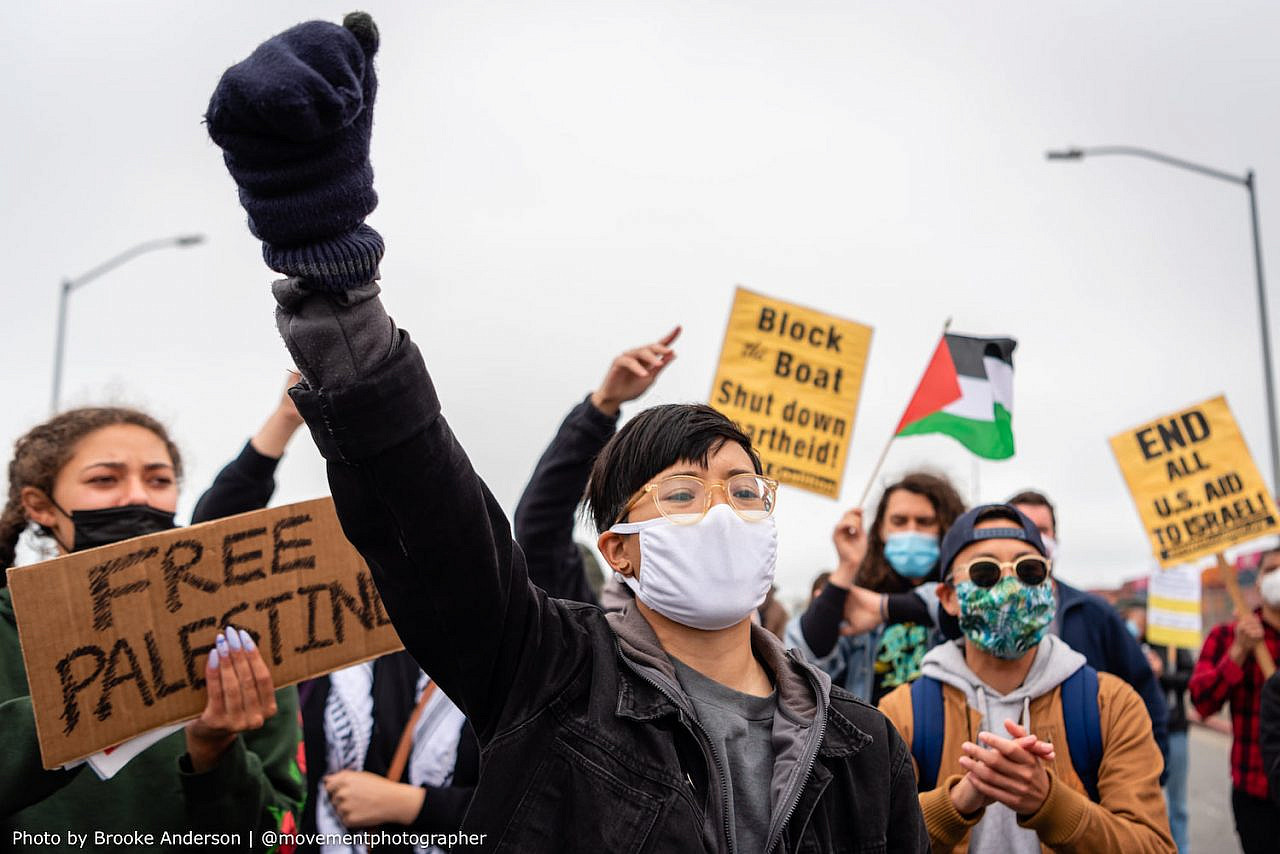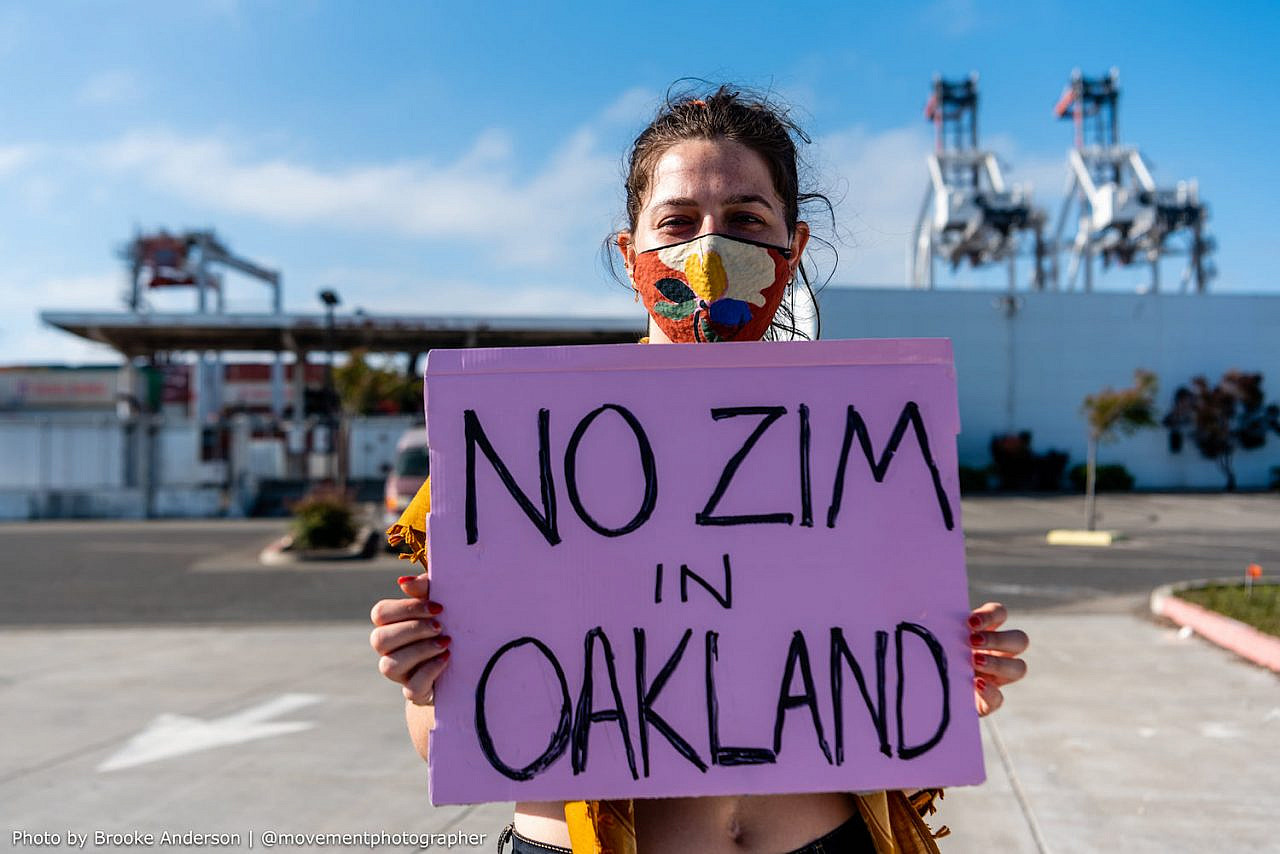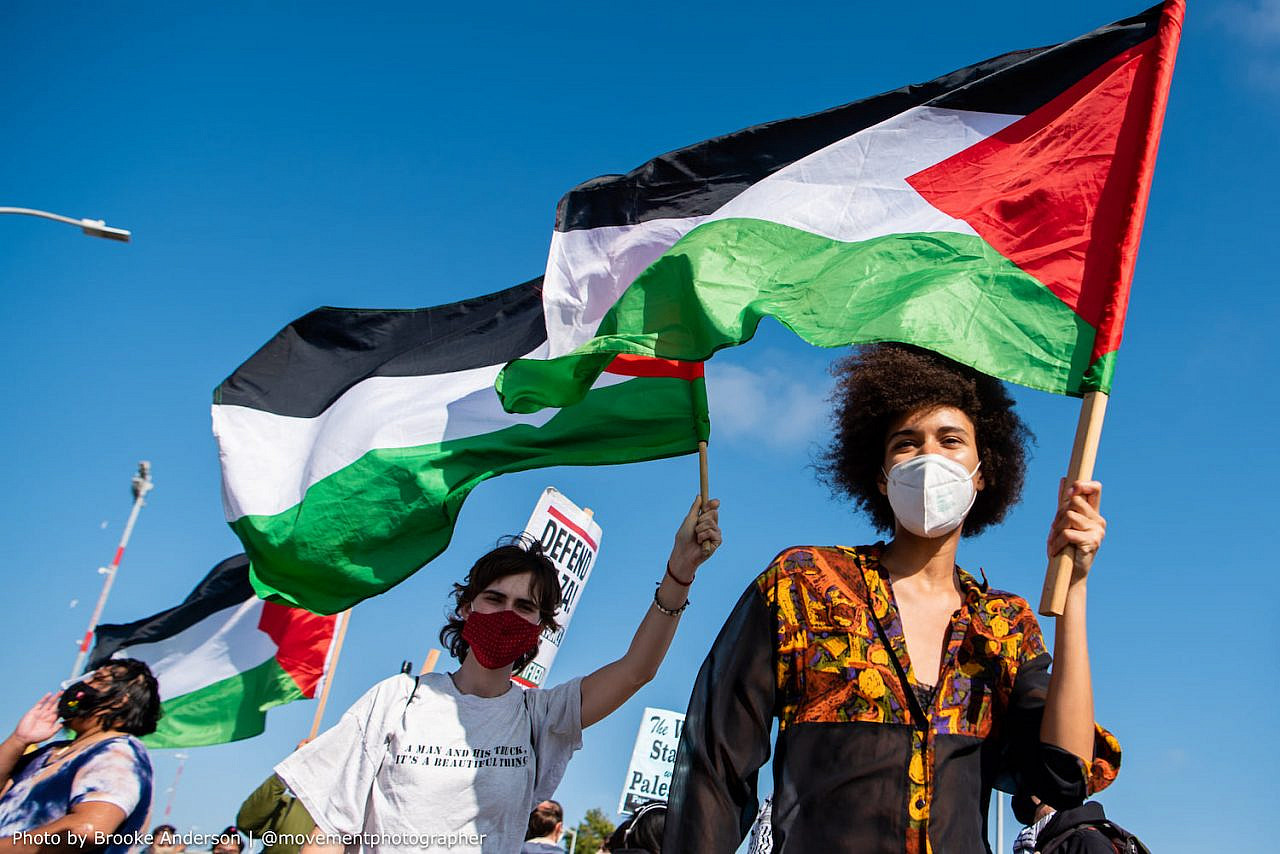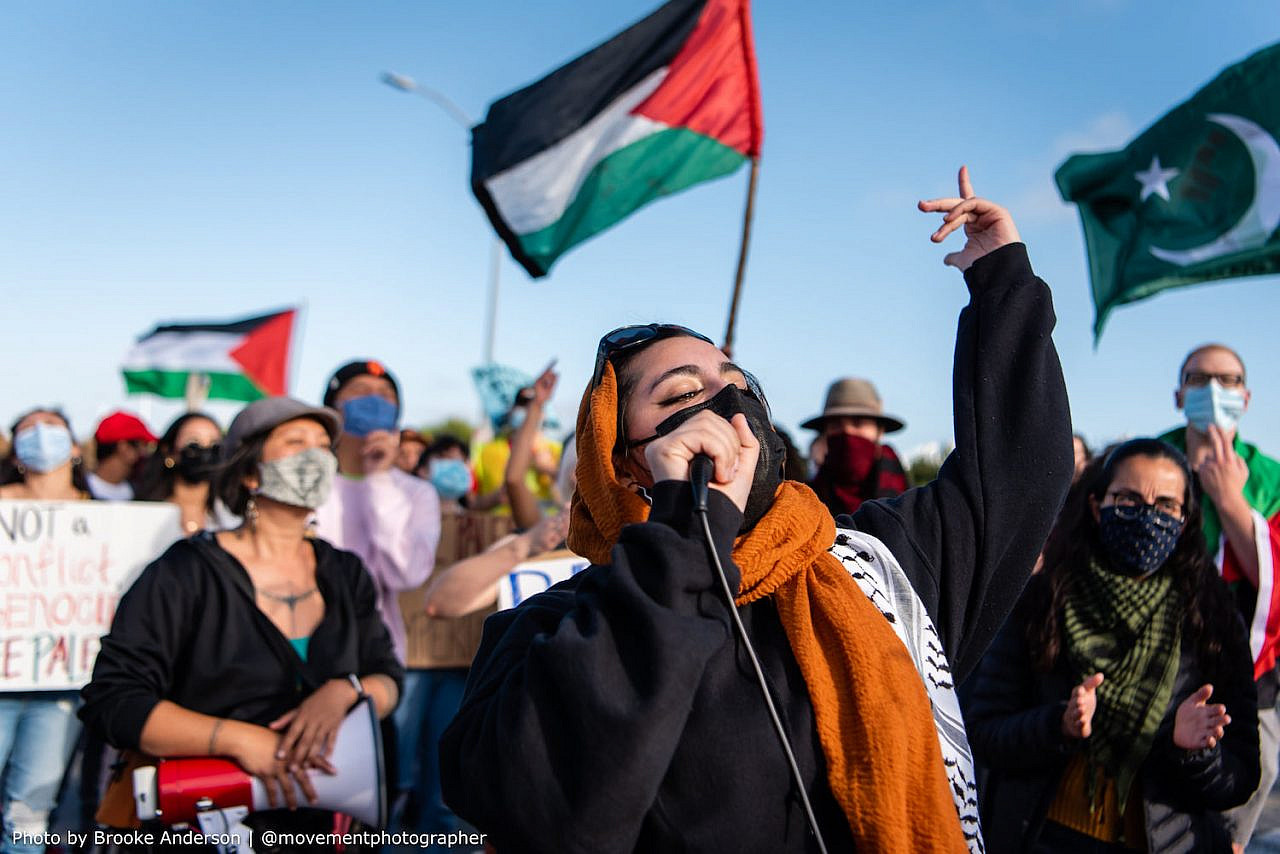A Brief Colonial History Of Ceylon(SriLanka)
Sri Lanka: One Island Two Nations
A Brief Colonial History Of Ceylon(SriLanka)
Sri Lanka: One Island Two Nations
(Full Story)
Search This Blog
Back to 500BC.
==========================
Thiranjala Weerasinghe sj.- One Island Two Nations
?????????????????????????????????????????????????Wednesday, September 1, 2021
How Palestinian resistance inspired a new generation of labor activism
Israel’s latest assault on Gaza has prompted US labor unions to mobilize at unprecedented levels, further establishing Palestinian rights as a core component of progressive politics.

A Palestine solidarity activist hoists the Palestinian flag as demonstrators move to block an Israeli-owned ship at the Port of Oakland, in protest of Israel's aggressions, June 4, 2021. (Brooke Anderson)
As Israeli airstrikes dropped U.S.-made bombs on Gaza in May, damaging schools and hospitals, displacing thousands of Palestinians, and killing 260 people, many Americans looked on in horror. Then, some decided to take action.
On May 19, the United Educators of San Francisco, the union representing 6,200 public school teachers and aides in the California city, passed a resolution endorsing Boycott, Divestment, and Sanctions (BDS), a movement promoting pressure on Israel until it stops violating Palestinian human rights. The union also called for the United States to end military aid to Israel, which it said was committing the crime of “apartheid.” (The United States sends $3.8 billion in annual military aid to Israel.)
The San Francisco resolution made history — it was the first time a public school union ever endorsed the BDS movement. Soon after, at least six other educator unions or individual union chapters passed similar measures. Other unions, from Roofers Local 36 in Los Angeles to journalists at The NewsGuild-CWA, published messages of support for Palestinians. And in June, a community picket organized by Palestinian rights advocates in the Bay Area succeeded in turning away an Israeli-owned ship after port workers refused to unload its cargo in protest of the Gaza violence.
The recent surge in support for Palestinian rights in the labor movement is one of the most tangible signs of how the debate on Israel has fundamentally changed in the United States. What was once seen as a fringe issue focused on a far-away conflict has turned into a central component of progressive politics, prompting labor unions to weigh in at unprecedented levels.
Palestinian rights activists attribute the shift to the call from Palestinian unions for solidarity in May; the growth of the BDS movement in the United States; the influence of the Black Lives Matter movement, which has embraced Palestinian rights activism; and the growing recognition by left-leaning Americans that Israeli rule over Palestinians constitutes apartheid — a recognition prompted by landmark reports from human rights groups B’Tselem and Human Rights Watch.
“It’s still very much on the margins of labor, but a lot more than it was [before],” said Michael Letwin, co-founder of Labor for Palestine, a group pushing U.S. unions to endorse BDS, and a former president of a union that represents public interest lawyers and advocates in New York City. “Every few years, there is a broadening of labor statements in this country on Palestine, and it usually comes after the intense attacks on Gaza. A new generation of young union activists in this country is inspired by Palestinian resistance.”
As Israeli violence against Palestinians escalated in May, Palestinian trade unions called for unions around the world to hold protests, publish statements, and refuse to handle Israeli goods. Many U.S. unions cited that ask in their Palestine solidarity resolutions. Palestinian rights advocates also say union solidarity with Palestine is in keeping with a core tenet of labor struggles: that “an injury to one is an injury to all,” as the Industrial Workers of the World once put it.
“Labor power has always been about international solidarity and all exploited people rising up against all forms of oppression,” said Lara Kiswani, executive director of the Arab Resource and Organizing Center (AROC), which led the Bay Area community picket that blocked the unloading of Israeli goods. “The everyday rank and file worker understands that. When they hear Palestinian workers asking for stands in solidarity, when they hear Palestinian workers are exploited, it’s very easy for them to make that connection, [to say], ‘we have a duty to be in solidarity with Palestinian workers.’”
But despite the recent success, labor activists who want a full turn to Palestine solidarity within unions still face significant challenges. Members of the National Education Association, one of the U.S.’s two national teachers unions, rejected a resolution at their annual conference in September calling on the United States to end aid to Israel. National union leadership also remains opposed to the BDS movement, and some of those unions have invested in Israel Bonds.
 |
Palestine solidarity activists move to block an Israeli-owned ship at the Port of Oakland, in protest of Israel’s latest aggressions, June 4, 2021. (Brooke Anderson)
The split over Israel between union locals and national leadership mirrors the growing gap within the Democratic Party, where grassroots activists and a handful of progressive legislators are moving further left on Palestine than party leaders, who remain committed to the traditional Washington consensus that the U.S.-Israel alliance should remain intact.
And while pro-Israel groups such as StandWithUs have failed to stop the initial wave of union declarations supporting the Palestinian call to boycott Israel, the Israel advocacy community is now finding its footing. Pro-Israel groups, particularly in Los Angeles, where the teachers’ union is debating a resolution on BDS, are helping those who oppose union resolutions condemning Israel’s actions in Gaza by organizing petitions and letters for teachers and parents to sign.
“Many labor union members have asked us for assistance, because they do not want their unions to promote campaigns of hate against Israel,” said Roz Rothstein, the co-founder and CEO of Israel advocacy group StandWithUs.
Union foreign policy
U.S. labor unions have a history of involvement in foreign policy issues. During the Cold War, the AFL-CIO, the largest and most influential federation of unions in the United States, worked with the U.S. foreign policy establishment to undermine leftist influence in overseas unions as part of their “business unionism” philosophy, which posited that unions should focus on accruing material advantages within a capitalist system, rather than agitate for broad societal change.
But other elements of the union movement took a different position on foreign affairs. When the AFL-CIO supported the Vietnam War, officials in the United Auto Workers dissented, calling for negotiations to end the war. And when the AFL-CIO supported President Ronald Reagan’s backing of an anti-communist government in El Salvador, other unions lobbied Congress to cut off U.S. military aid to the country.
On rare occasions, Palestine was the subject of action by workers with an internationalist lens on politics. In 1969, the newspaper of the Detroit-based League of Revolutionary Black Workers, a movement that launched wildcat strikes carried out without the official backing of a union, published articles in support of Palestine. In 1973, almost 2,000 Arab-American workers at Detroit auto plants walked off the job to protest the United Auto Workers union buying of Israel Bonds, a common way of investing in the Israeli economy.
Around 2,500 Palestine solidarity activists march to the Port of Oakland to block an Israeli-owned ship, in response to Israel’s assault on Gaza, August 16, 2014. (Daniel Arauz)
Union support for Palestinians under Israeli occupation emerged again in the early 2000s, in response to Israel’s measures during the Second Intifada. Building on its decades-long history of labor action against international repression, the International Longshore and Warehouse Union (ILWU) local in Oakland, which represents Oakland port cargo handlers, released a statement calling for an end to U.S. military aid to Israel.
But before this year’s labor actions, the most notable moment in the history of U.S. labor solidarity with Palestine came in 2014, as Israeli bombs rained down on Gaza during Operation Protective Edge. That year, UAW 2865, which represents more than 19,000 graduate workers in the University of California system, became the first major union to endorse BDS. (UAW leadership ultimately overturned the local’s decision.)
On Aug. 16, 2014, the Arab Resource and Organizing Center launched a community picket at Oakland’s port, known as the “Block the Boat” campaign. Thousands of people came out to the action, calling on ILWU port workers to refuse to unload cargo from an Israeli ship owned by ZIM Integrated Shipping Services, a company that has shipped Israeli weaponry. The picket worked, at least for a time: ILWU workers honored the community picket for four days and refused to handle the Israeli goods. Ultimately, workers unloaded the ship after the boat left the Oakland port and then secretly returned to bypass protests.
ZIM did not return to Oakland for years — until another ship owned by the company tried to dock in Oakland in late May 2021, in the aftermath of yet another Israeli assault on Gaza. AROC launched another community picket, and once again, ILWU honored it. The ship never docked in Oakland, and was also held up by other community pickets in Canada and Seattle, where it eventually docked and unloaded goods after the police there broke up the picket line.
“It was the workers in Palestine that put out a call not to unload Israeli cargo. We brought that call to ILWU’s union hall, spoke directly to them and showed why we’re holding a community picket. The workers responded to that and it was met with action,” explained AROC’s Kiswani.
The ILWU union chapter in the Bay Area was particularly receptive to the calls from Palestinian rights activists because of its history as a Black-led union allied with social justice movements.
“It’s one of the most militant and principled labor organizations in the country. They have an internationalist lens, and they do a tremendous amount of political organization,” said Wassim Hage, an organizer with AROC. “They’re predisposed towards flexing worker power and showing the bosses what the ILWU is capable of.”
A Palestine solidarity activist holds a sign as demonstrators move to block an Israeli-owned ship at the Port of Oakland, in protest of Israel’s aggressions, June 4, 2021. (Brooke Anderson)
Palestinian rights advocates say the “Block the Boat” action is perhaps the most important type of BDS campaign that activists have taken up.
“When school student governments pass a divestment resolution, it’s more of a recommendation. But the schools don’t actually pull out money. When longshoremen decide not to unload Israeli ships, they actually lose money. So it’s one of the most successful, tangible forms of BDS,” said Nerdeen Kiswani, a New York-based Palestinian activist (who is not related to AROC director Lara Kiswani). In May, she took part in protests that tried, but failed, to block the unloading of goods from another ZIM ship docked at the New Jersey port.
But while the “Block the Boat” success of 2021 was a reprise of its 2014 victory, the wave of teachers’ unions condemning Israel’s human rights abuses marked a new phase in the push to move labor closer to the Palestinian rights movement.
Teachers speak out for Palestine
The San Francisco union’s endorsement of BDS inspired teachers in Seattle and Los Angeles to push their own unions to pass similar resolutions. In Seattle, the measure to endorse BDS and call for the United States to end military aid to Israel passed with 90 percent of the vote.
While the immediate impetus was anger at Israel’s push to displace Palestinian families in Sheikh Jarrah and the deadly aerial assault on Gaza, teachers in Seattle who organized around the resolution say it got so much support because of the organizing teachers in the city had done around another issue: police brutality against Black people. The link between U.S.police militarization and Israeli occupation was made explicit in the resolution, which urged to end the Seattle Police Department’s practice of sending officers to train with Israeli forces.
“We made the link between our union’s stance on Black Lives Matter, anti-racism and white supremacy [and Palestine],” said Emma Klein, a Seattle elementary school teacher. “That link was really powerful when we presented it to the representative assembly. The struggles Black and brown people face in the United States are not the same as the struggles people in Palestine face, but there’s so many similarities, that if you stand for Black Lives Matter, you have to stand for Palestinian liberation.”
In New York, the delegate assembly of the Professional Staff Congress (PSC), the union representing faculty and staff who work in the City University of New York system, passed a measure in June calling for the United States to end military funding of Israeli human rights abuses by a 84-34 vote.
Palestine solidarity activists hoist the Palestinian flag as they move to block an Israeli-owned ship at the Port of Oakland, in protest of Israel’s aggressions, June 4, 2021. (Brooke Anderson)
“When I came to CUNY as a freshman, which was in 2012-2013, I had been introduced to professors and people who were part of the union. We wanted to do work on Palestine. A lot of these professors were supportive, but whenever we talked about doing anything at the PSC level, they used to say ‘Palestine for the PSC is a third rail,’” said Nerdeen Kiswani, who is also a member of CUNY4Palestine, a group of professors and students organizing within the CUNY system for Palestinian rights. “[So] much has changed in less than 10 years. A resolution like this is one of the markers of progress that we’ve been able to achieve.”
A backlash emerges
But the overwhelming union support for Palestinian rights has also been met with a backlash. A small number of professors in the PSC — at least 50, according to one report — have stopped paying union dues in protest of the decision to condemn Israel’s human rights abuses.
After the executive board of the Rutgers union for part-time faculty published a statement calling on their parent union, the American Federation of Teachers, “to divest itself of all Israeli bonds and for the United States government to cease all financial support to Israel at once,” Democratic Rep. Josh Gottheimer of New Jersey condemned the union. In a letter to the Rutgers University president, Gottheimer connected the statement to the upsurge in antisemitic attacks in the United States — a linkage that executive board member David Letwin, who is also a member of Jews for Palestinian Right of Return (and the brother of Labor for Palestine’s Michael Letwin), called “part of a much broader campaign by Israel’s supporters to silence Palestine advocates with manufactured accusations of anti-Jewish bigotry.”
The Los Angeles teachers’ union has also been embroiled in a particularly fierce debate. The May decision by five Los Angeles teachers unions’ chapters to issue statements in solidarity with Palestinians, and in three resolutions endorse BDS and demand a halt to U.S. aid to Israel, led the United Teachers of Los Angeles to schedule a September union-wide vote on the measure. That has spurred Israel advocates to mobilize to defeat the resolution, setting up a clash for the upcoming meeting.
The LA union chapters’ statements also led to vitriolic arguments among union members on opposing sides, with Israel supporters in the union claiming the resolutions were personal attacks on them as Jews, said Maya Daniels, an LA teacher who brought a pro-BDS resolution to her union chapter in the Harbor Region area in the city. Meanwhile, Palestinian rights advocates within the union have been the subject of social media harassment.
Palestine solidarity activists move to block an Israeli-owned ship at the Port of Oakland, in protest of Israel’s latest aggressions, June 4, 2021. (Brooke Anderson)
“Someone took 70 pages of comments from a union group, and sent them to my boss, and my bosses’ boss, and my bosses’ bosses’ boss, and to three rabbis in the area, to get me fired,” said Daniels, an LA teacher who brought a pro-BDS resolution to her union chapter in the Harbor Region in the city.
According to Daniels, the energy to continue pushing for Palestine solidarity within the union dissipated as members realized the controversy it aroused. Now, she added, the UTLA leadership is looking to head off a union-wide vote on the Palestine resolutions. Instead, they plan to put forward a resolution to table the vote, and organize forums to discuss the issue. The UTLA did not respond to a request for comment from +972.
Daniels said she expected that resolution to pass, killing the chance for a union-wide vote. “The organization as a whole caved to bullying and intimidation,” she said.
Still, Daniels noted that even if the vote on a Palestine solidarity resolution is killed, the resolutions were a success in that they broke the silence on a topic too many people were afraid to touch before the escalation in Israeli violence in May.
“I don’t think it’s going away at all. For a lot of members who did go through the fire [of controversy over Palestine], it was educational, empowering, fortifying,” Daniels told +972. “This wasn’t our moment. There wasn’t the groundwork. There wasn’t the energy. But it’s not going to go away. We’re going to wait until the next uproar — the next time there’s a trending hashtag, the next video. It’s not ignorable anymore.”





